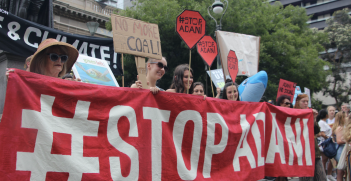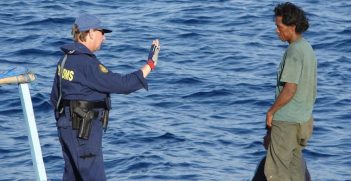Prosecuting MH17 and the Dutch and Australian Move on Russia’s State Responsibility

The legal proceedings on MH17 will entail many more years of complex legal prosecution. Nevertheless, there appear to be progressive steps towards accountability both of individuals and of Russia as a state.
On 19 June 2019, the MH17 Joint Investigation Team (JIT) charged Igor Girkin, Sergey Dubinsky, Oleg Pulatov and Leonid Kharchenko with the highest possible charge: murder. These four individuals were involved in supplying and transporting the BUK missile that brought down Flight MH17 rather than actually launching the missile.
The countries collaborating in the Joint Investigation Team — the Netherlands, Australia, Ukraine, Malaysia and Belgium — have agreed that MH17 suspects will be prosecuted in the Netherlands. The trial against these four suspects will commence on 9 March 2020 before the District Court of The Hague. For logistical and security reasons, the hearings will be held in the special high-security judicial complex at Schiphol.
This article discusses the charges brought against these suspects as well as the relevance of these criminal proceedings against individuals for last year’s decision by the Netherlands and Australia to hold Russia accountable as a state for its role in downing MH17.
The Four Indictments
These — first — four suspects will likely not stand trial in person since they remain at large. Nevertheless, the Dutch criminal law system allows for trials in absentia when held in accordance with certain procedural requirements that were formulated by the European Court of Human Rights. They are also allowed to participate in the proceedings despite not showing up by sending an attorney that can act on their behalf, while themselves staying out of reach of JIT enforcement authorities.
According to the Prosecution, the four suspects were active in the armed conflict in the Donetsk province in July 2014, fighting against Ukrainian armed forces to gain territorial control and using anti-aircraft weaponry to fight off the Ukrainian air force. They “cooperated to obtain and deploy the BUK TELAR at the firing location with the aim of shooting down an aircraft. For that reason, they can also be held jointly accountable for downing flight MH17,” the JIT explained. They reason that the plans, actions and the cooperation of and between these four suspects ultimately led to the shooting down of MH17. Their role was not in the actual launching of the missile, but they are accused of having brought the BUK TELAR to the firing location with the aim to shoot down an aircraft, and are therefore held to be co-perpetrators of the crime of bringing down an aircraft and killing those on board. They are charged with causing the crash that resulted in the death of all persons aboard in accordance with Article 168 of the Dutch Criminal Code and with murder, provided by Article 289 of the Dutch Criminal Code.
The JIT did not want to disclose their prosecutorial strategy yet and explained that they will do so in court next year. They did respond briefly to the argument that the intention of launching the BUK could have been to shoot down a military plane in the context of armed conflict by stating that they would then still hold them accountable and that the downing of a military plane would also have been a crime. This may entail at least two things.
First, the Prosecution may be arguing that those that were involved in shooting down MH17 did not have combatant privilege, which is the right to engage in hostilities. In an international armed conflict, which according to the Office of the Prosecution of the International Criminal Court it was at the time that MH17 was shot down due to involvement of the Russian armed forces, combatants have the right to use military means in accordance with International Humanitarian Law, which prescribes, for instance, that their force needs to be a military necessity, proportionate, and directed at a military target — the “principle of distinction” — which for instance obliges combatants to ensure to a reasonable amount of certainty that the target is non-civilian before launching a missile into the air. The many legal questions that the Dutch judges will need to address during trial may therefore include the nature of the conflict in Eastern Ukraine as an international or non-international armed conflict as well as whether those that launched the BUK missile were so-called “unlawful combatants” and what status this disputed concept has in contemporary international and Dutch law.
Second, the prosecution may also be arguing that even if they would have had combatant privilege and intended to shoot down a military target, they failed to take the necessary measures to identify the target and thereby violated the principle of distinction. While this primarily sees to those that were responsible for the command to launch the missile, the Prosecution’s argument may be that since the BUK TELAR was delivered with the intent to shoot down a plane, and since this BUK lacked the means to identify the target and thereby properly distinguish between military and civilian target, everyone involved in delivering the missile system to the launch site has collaborated in taking the significant risk that civilians would die, thereby meeting the standard required for intent, in the form of dolus eventualis: the perpetrator knew that the actions could have a certain consequence, continues the acts and thereby knowingly and willingly accepts those risks.
It remains to be seen how the prosecutorial strategy will unfold, depending also on what facts and evidence they can present in court, starting next year. The JIT furthermore continues its investigations and may indict additional suspects in the future. It thereby specifically mentioned that the investigation “will continue to focus on the crew of the BUK TELAR and on persons who were an important link in the decision-making in the Russian Federation on military support in Eastern Ukraine in 2014.” Moreover, trying to hide or destroy evidence are separate crimes, which could be held against those that were involved in transporting the BUK away from the launching site after MH17 crashed as well as those that tried to destroy the black boxes and other information that should have been contained and handed over to investigatory authorities. Perhaps the Prosecution will therefore in the future open more cases in addition to the four suspects they will start to prosecute in March 2020.
Relevance for State Responsibility
While these criminal proceedings against individual suspects are independent from the legal proceedings to hold Russia accountable as a state under the doctrine of state responsibility, these prosecutions may contribute substantially nevertheless. On 25 May 2018 the Netherlands and Australia jointly announced to hold Russia accountable for its involvement in downing MH17. Representatives of the Netherlands and Australia declared that they believe there is convincing evidence that MH17 was shot down by a BUK TELAR that belonged to the Russian military, that Russia was possibly itself involved in shooting down MH17 and that Russia failed to fulfil its legal obligation to investigate the causes of and people possibly involved in the MH17 crash. I refer to my articles in the Netherlands Yearbook of International Law 2018 and the Utrecht Journal of International and European Law for the legal arguments to these claims with references to legal sources.
Earlier in 2019, the Netherlands and Australia started negotiations with Russia. Even if these negotiations fail to bring an agreement, having a process of genuine negotiations is a procedural requirement for possible future legal steps, where an international court will only be able to hear the case if parties have first attempted to resolve the dispute through negotiations. If it will come to such legal proceedings, a possible ruling by the Dutch criminal court that Russian nationals, particularly Russian military, were involved in delivering and downing MH17 will be important corroboration for the argument that Russia as a state was involved.
Under international law, when the military of a state is involved, the actions of the military are attributable to the state. It is therefore relevant that the JIT emphasized that the individual suspects refused to answer whether Dubinsky was employed by Russia on 17 July 2014, which according to the JIT Russia has.
Moreover, Russia’s refusal to supply information requested by the JIT also powerfully supports the Dutch and Australian claim that Russia has — in addition to its unlawful involvement in downing MH17 — violated its international legal obligations to cooperate with the investigations of the JIT.
Conclusion
The legal proceedings on MH17 will take many more years and entail complex legal questions and challenging investigatory circumstances, with a crime scene located in an ongoing armed conflict and a state that refuses to cooperate. Nevertheless, there appear to be progressive steps towards accountability both for individual responsibility and that of Russia as a state.
While they are legally separate, these legal routes may well assist each other and — in a long future ahead — contribute to a form of justice. They won’t bring the victims back, and it seems unlikely that those responsible will acknowledge this and accept punishment. But they may at least allow an independent judicial setting in which the evidence is presented and tested with authoritative judicial rulings that explain what has happened and who is responsible. Moreover, if individuals are convicted, they will always depend on Russian protection, without guarantees that a future government will be willing to do so. They could also be extradited should they ever travel abroad.
This is not much for those that lost loved ones. But in the context of geopolitical reality and a world order where the international legal order is only allowed to play a limited role and lacks law enforcement, a criminal court of law convicting Russian and pro-Russian Ukrainian fighters for shooting down a plane and an international court of law concluding that Russia was involved, would still be quite something.
Dr Marieke de Hoon is assistant professor of International Law and International Criminal Justice at Vrije Universiteit Amsterdam, director at the Netherlands Office and senior counsel at the Public International Law & Policy Group (PILPG).
For legal analysis on MH17, see Marieke de Hoon’s publications titled “Navigating the Legal Horizon, Lawyering the MH17 Disaster” and “Pursuing Justice for MH17. The Role of the Netherlands,” Chapter 11 in the Netherlands Yearbook of International Law 2018.
This article is published under a Creative Commons Licence and may be republished with attribution.





